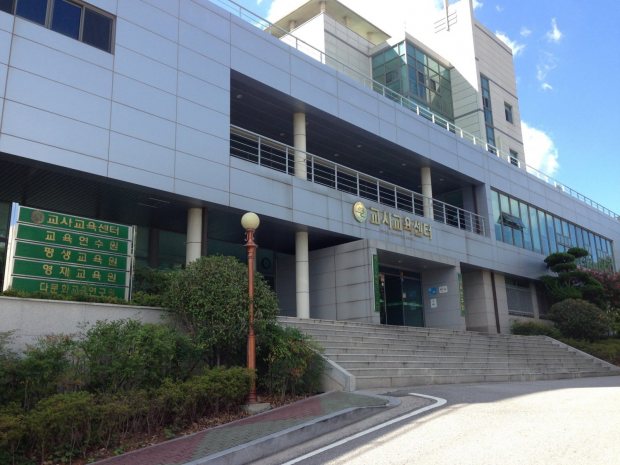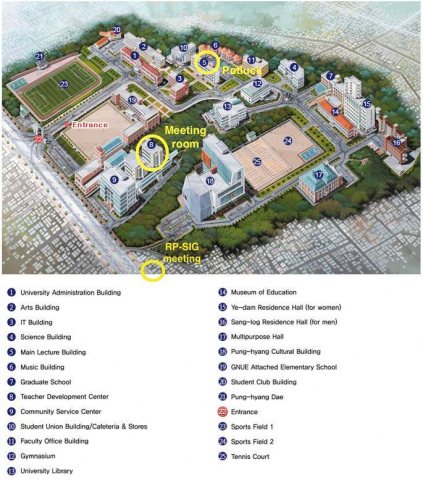
Gwangju-Jeonnam Chapter May Meeting
.
––– Morning Reflective Practice Session –––
Time: 11:00 am - 12:30 pm (3rd Sat., May 20)
NEW Location: Coffee Lab Mujii (formerly Aldersgate. NOT at Kenya Espresso Cafe), near GNUE. (Ground floor of 광주우리교회 Building. Map at bottom.)
ㅡ Topic: Non-Violent Communication
ㅡ Facilitator: Dana Han
––– MAIN MEETING SCHEDULE –––
Time: 3rd Saturday, May 20, 2017, 1:45 - 5:00 pm
Location: Gwangju National University of Education (GNUE), Teacher Training Center (교사교육센터) 1st Floor; Room 811. Detailed directions HERE.
1:45 pm: Sign-in and Meet-and-Greet (Admission: Free for first-time attendees. Membership welcomed.)
2:00 - 2:50 pm: Presentation 1
Topic: Effective Questioning Strategies
Vanessa Reid (Jeollanamdo Educational Training Institute - JETI)
2:50 - 3:15 pm: Refreshment Break
3:15 - 4:05 pm: Presentation 2
Topic: Neuromyths: What They Are and What We Can Do About Them
Tracey Tokuhama-Espinosa (Interactive Video Workshop. Facilitated by David Shaffer)
4:15 - 4:45 pm: Swap-Shop Presentations
Share your Teaching Ideas, Classroom Activities, and Teaching Wisdom with the group.
(Everyone is encouraged to share [up to 5-6 min. each]. Short tidbits are welcomed. Handouts also welcomed.)
4:45 - 5:00 pm: Announcements / Drawing for Door Prizes / Closing
Presentation Summaries and Presenter Biodata.
Effective Questioning Strategies
By Vanessa Reid
In this talk, Vanessa will outline three common questioning strategies used in the classroom and comment on their effectiveness in terms of engaging students in thinking and participating. Changing one’s questioning strategies can be more effective at increasing student engagement than changing instructional methods or activity types. These strategies can be applied to any subject at any level and will also allow the teacher to get a better idea of how many students understand the concepts being taught.
The Presenter

Vanessa Reid has been a teacher trainer at the Jeollanamdo Educational Training Institute (JETI) since 2010. She holds degrees in music education and education, and is a certified teacher through the Ontario College of Teachers. During her time at JETI, she has focused on pronunciation skills and methodology, and microteaching (general teaching skills), with the hope of increasing Korean English teachers’ confidence in their own skills as well as their ability to create engaging and effective English classes at all levels.
____________________
Neuromyths: What They Are and What We Can Do About Them
By Dr. Tracey Tokuhama-Espinosa
(Interactive Video Workshop. Facilitated by David Shaffer)
In 2016, 40 thought leaders in 11 different countries agreed on the guiding principles, tenets and goals of Mind, Brain and Education Science (Tokuhama-Espinosa, 2017). This Delphi Panel also agreed, however, that there were more myths on the educational landscape than ever before. Howard-Jones’ research shows that more than 50% of teachers around the world mistakenly believe in neuromyths, which can potentially do harm in the classroom. The experts concurred that a pre-requisite to applying the Principles and Tenets in teaching is to first understand and to avoid the neuromyths, but to date, few programs train teachers on how to avoid neuromyths. Tracey will highlight 40 myths on the educational landscape by video and David Shaffer will guide participants in discussion activities based on her comments. Though this workshop is video-recorded, the session will be very much audience-participatory.
The Presenter

Tracey Tokuhama-Espinosa currently conducts educational research with the Latin American Faculty for Social Science in Ecuador and teaches “The Neuroscience of Learning: An Introduction to Mind, Brain, and Education Science” at the Harvard University Extension School. Tracey works with schools, universities, NGOs, and businesses in 27 countries around the world and has more than 26 years of teaching, administrative, and research experience from kindergarten through university levels. This prolific writer and researcher is devoted to our field, Mind, Brain, and Education. Her most recent book is Making Classrooms Better: 50 Practical Applications of Mind, Brain, and Education Science.She was a plenary speaker at last year’s KOTESOL international conference and presented this month via video at the FAB11 - KOTESOL National Conference 2017.
____________________
Photo: The Gwangju National University of Education (GNUE / 광주교육대학교), Teacher Training Center (교사교육센터), venue for our main meeting - 1st floor, Room 811.




